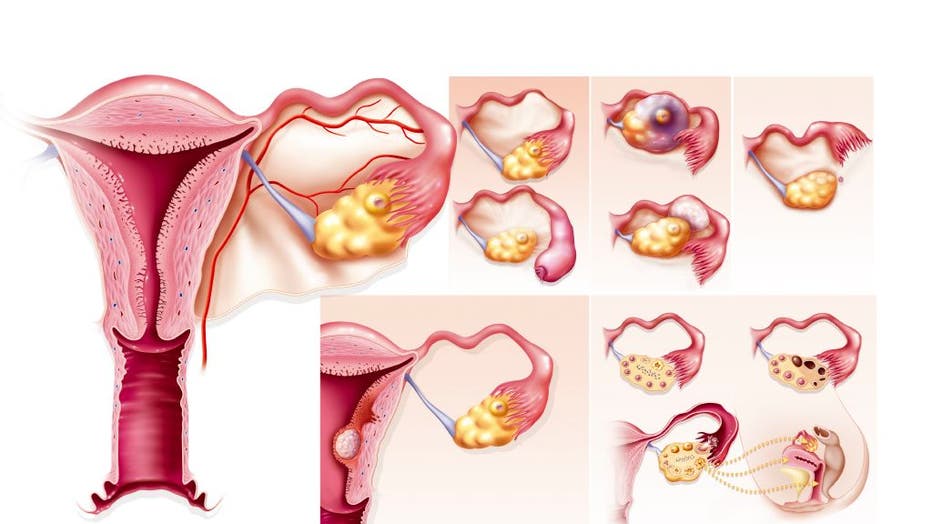Air Force vet who battled tough fertility issue tells others, 'Knowledge is power'

Air Force veteran Jasmine Zielomski of California is spotted in uniform while on active duty. (514th AMW Public Affairs JBMDL)
California native and Air Force veteran Jasmine Zielomski struggled with a relatively common but rarely discussed fertility foe — and wound up turning it into a success story.
While it wasn't easy, her tale of triumph offers a message for hope for many other women across the U.S.
For more than a decade, Zielomski said she experienced difficulties in getting pregnant — and finally sought out professional help.
She was first diagnosed with PCOS — polycystic ovary syndrome — at age 31. This issue causes seven million girls and women across the U.S. each year to experience hormonal imbalances.
"I never had any pregnancy scares, ever," she revealed to Fox News Digital. "And I kind of always had an irregular period, and I just thought that was just how my body was," she said.
"I didn't know this for so many years … I’d been to so many different gynecologists over the years and had no answers," she said.
After meeting with a doctor two years ago who guided her through a failed attempt at in vitro fertilization — and although 20 of her eggs were retrieved — the Air Force air traffic controller ultimately contacted Dr. Jane Frederick of Newport Beach, Calif., an internationally known fertility specialist, for a second opinion.
CLICK HERE TO SIGN UP FOR OUR LIFESTYLE NEWSLETTER
Frederick is the medical director of one of the largest in vitro fertilization centers west of the Mississippi.
Soon, the tide began to turn for the Air Force veteran.
Leading cause of female infertility
The hormone disorder PCOS affects about 3% to 10% of reproductive-age women and is the leading cause of female infertility.
It can also cause irregular periods, increased hair growth, acne flare-ups, weight gain and glucose intolerance.
COULD MY IRREGULAR PERIODS BE PCOS?
In an interview, Dr. Frederick shared with Fox News Digital that her practice specializes in treating women with PCOS who may be unaware of how to manage the symptoms — or are having trouble getting pregnant.

An illustration of the causes of female infertility. Top right, an illustration of various Fallopian tube pathologies. Below that, an illustration of various pathologies of the uterus. Also, an illustration of pathologies of the ovaries: ovulatory in
The board-certified OB-GYN and reproductive endocrinology specialist said it’s important for women who may be struggling with PCOS to know the signs — and consult with a doctor for diagnosis and treatment.
The disorder mainly blocks ovulation by halting the ovaries from releasing eggs.
There’s no cure for PCOS — and it can cause long-term medical problems such as diabetes, heart disease and uterine cancer if left untreated.
Frederick encouraged patients to remember that they are not alone in this journey and to reach out to various and available support groups.
"The emotional issues are really tough for this group because women feel that their body is just not working," she said.
WOMEN WITH COMMON OVARY PROBLEM MAY NOT GET RECOMMENDED TESTS
"This can lead to irritability, anxiety — and that makes it really tough to have a normal life. It [can have] a great effect on their emotional lives and their relationships with their partner," she added. "I urge women to be read about it, be aware of what the diagnosis is … and to know that you’re not alone."
‘This was a sign’
Zielomski returned to her previous doctor with Frederick’s recommendation of introducing Metformin as a treatment for her dark, granular eggs. The doctor agreed — but then allegedly under-stimulated her, as they carried on with a second IVF attempt.

Former Air Force air traffic controller Jasmine Zielomski poses with her Defense Information School (DINFOS) diploma. (Jasmine Zielomski)
Another grueling process and thousands of dollars later, Zielomski was out of luck once again. Discouraged, she looked into fertility benefits through the military.
She found a program that covered three rounds of IVF; it also offered a list of in-network physicians. Frederick was one of the doctors listed.
"I was like, this is a sign!" she exclaimed. "This [was] definitely a sign that I should be going to her."
The veteran began treatment with Dr. Frederick and underwent IVF once more, while being treated with Metformin.
After the first round, 22 of her eggs were retrieved, which produced 10 normal embryos and paved the way for a successful transfer in February.
As of this writing, Zielomski is 14 weeks pregnant with her first child. Her baby is due in October.
"Dr. Frederick … knew exactly the kind of medication that I needed, the dosing that I needed and was able to give me the results that I needed."
Zielomski added, "And just to prove to myself, there was nothing wrong with me besides the fact that I had PCOS — and she just knew how to handle that."
The mother-to-be shared a message for other women who may be struggling with PCOS that "knowledge is power" when it comes to a disease that is not spoken about often.
"It’s not anything to be embarrassed about," she said. "Definitely reach out and be very open with your doctors about all of your symptoms so that you can get the treatment that you need."
Said Dr. Frederick about the issue, "I talk to a lot of moms groups and I tell them that, if you have a young daughter who's just starting her menstrual cycle at age 12, and you're noticing that she's had irregular cycles, problems with acne, weight gain, all of these symptoms — it might be a diagnosis of PCOS," she said.
"Moms can really be the first caregiver to make this diagnosis."
Most treatment for girls struggling with PCOS is a hormonal birth control pill to regulate periods. But when it comes time for a PCOS patient to attempt pregnancy, Dr. Frederick explained this is where a fertility specialist should be part of the equation.
"First of all, make sure that other reasons for infertility are ruled out," she advised. "I also tell my couples that 40% of female infertility is due to the male factor."
CLICK HERE TO GET THE FOX NEWS APP
If issues persist, Frederick suggested medication like Metformin, which is a glucose regulator, or Inositol, which is similar to a vitamin supplement.
"Both of those treatments can help regulate the glucose intolerance that we see often in PCOS," she said. "And it helps to regulate the hormones better so that patients can operate on a regular basis."
An additional treatment, Clomid, also known as Letrozole, may help promote regular ovulation. Always consult with professionals before taking any drug, of course.
"It’s all about promoting ovulation, getting [a woman's] cycles more regular and helping her with the ancillary symptoms like hair growth with weight issues and the insulin sensitivity," the doctor said.
PCOS can cause a high risk of miscarriage in pregnancies, yet there have been breakthroughs for patients who have undergone certain treatment.
Also, a more holistic approach to addressing imbalances is diet and exercise, with a focus on filling up on carbohydrates found in fruits, vegetables and whole grains.


